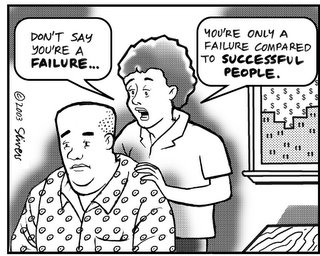Life Lessions to learn from Sports: Part 2 - learning to handle failure
 Failure does not feel good. I think nobody desires to fail. In life just about all we do is designed to make us feel good, or prevent us from feeling bad. I'm quite sure failure feels bad. Its our response to failure that is important. A positive response can mean we learn from failure and we grow from it. A negative response that is un-processed can stunt further development. Sports is a great place to learn how to handle failure becuase there is nobody in all of any sport anywhere who has never lost before.
Failure does not feel good. I think nobody desires to fail. In life just about all we do is designed to make us feel good, or prevent us from feeling bad. I'm quite sure failure feels bad. Its our response to failure that is important. A positive response can mean we learn from failure and we grow from it. A negative response that is un-processed can stunt further development. Sports is a great place to learn how to handle failure becuase there is nobody in all of any sport anywhere who has never lost before.
I have been on softball teams where we were the best team in the tournament by far. Running opponents over by 60-80 points. Man I thought we were tough. I was 15 at that time. Then we went to australia to play the Western Australia state under 16 team. Australia has a wonderful youth development system for many sports and we found out first hand that its very successful. I couldnt beleive that the guys of the same age as us could be that much better... needless to say... we got flattened. Not plesant at all! But man that trip really exposed our teams weakneses and we got alot better the next season. Another place where I put myself in a position to fail is in weightlifting. Its a very easy sport to find the winner in. Whoever lifts the heavier thing... wins. Very little (just legal technique) is left to judges or umpires of any kind. There is no clock to manage, there is no tactical play. I love to challenge myself to lift more and more. A lifter cannot lift an "all out" attempt every day. The more advanced a lifter is, the longer the period between attempts at a record. For me, i train 8-12 weeks before attempting a new record. The first time i lifted 145kg in the bench press, i was elated. That was 12 weeks of training to bring up my lift 10kg from about 135kg to 145kg. There are also times when i go for a lift and i fail. I struggle for a few seconds at the most difficult angle (where your leverages are the worst and most disadvantageous) and then cannot any more and let the weight drop onto the safety bars (hospitalization is bad, hospital food is bland, i make sure all safety precautions are in place!). Does that mean that I wasted 12 weeks of my life? I really do not beleive so. when I fail i learn at which point of the lift i fail and the next trainign block i place special emphasis on that weakness and the muscles that will need to be strengthened to succede in my next attempt.
Another place where I put myself in a position to fail is in weightlifting. Its a very easy sport to find the winner in. Whoever lifts the heavier thing... wins. Very little (just legal technique) is left to judges or umpires of any kind. There is no clock to manage, there is no tactical play. I love to challenge myself to lift more and more. A lifter cannot lift an "all out" attempt every day. The more advanced a lifter is, the longer the period between attempts at a record. For me, i train 8-12 weeks before attempting a new record. The first time i lifted 145kg in the bench press, i was elated. That was 12 weeks of training to bring up my lift 10kg from about 135kg to 145kg. There are also times when i go for a lift and i fail. I struggle for a few seconds at the most difficult angle (where your leverages are the worst and most disadvantageous) and then cannot any more and let the weight drop onto the safety bars (hospitalization is bad, hospital food is bland, i make sure all safety precautions are in place!). Does that mean that I wasted 12 weeks of my life? I really do not beleive so. when I fail i learn at which point of the lift i fail and the next trainign block i place special emphasis on that weakness and the muscles that will need to be strengthened to succede in my next attempt.
Of course there will be times when we fail. Its dangerous to go through life never experienceing failure, cos if we never do, we will never learn to handle it. It can be a great stimulus for growth and development!
In the area of the mentality of the athlete, being "afraid to lose" is one of the most devastating mental states to be in. Personally i can understand that a close basketball game would make late game free throws a high pressure situation. A player who is afraid to lose would feel extra pressure and be more likely to miss. But with the team i help to coach, im finding out that being afraid to lose dulls not just fine motor skill activities like shooting freethrows or making passes under pressure but also things like fighting for loose balls and crashing the boards for rebounds. It is such a paralysing thing - the fear of faliure. A champion does not think of failing. I beleive there are some things that are in a good sportsman's mind in the midst of competition. Im no psychologist (not yet at least, i do plan to do a postgraduate course in sports psychology) but here are some things i think are in the mind of a champion. Of course this is not only sports related. But a entrepeneurer starting a business, a student preparing for exams, a person getting ready for a public speaking situation, all can benefit from such a mindset.
1. Preparing like a champion - confidence in your preperation
Sometimes we may get fear of falilure because we know deep down that we have not prepared enough. If i remember correctly it was Muhammed Ali the champion boxer who had a nice way to put it "you can cheat on traning now, in the darkness of the early morning run, but it will be exposed eventually under the bright lights of the ring." One of the reasons ali was so dominant for so long was that he was in excellent condition. He knew that "more sweat in training = less blood in war" and trained accordingly. So when he met his opponent he was absolutely confident that he would not be disadvantaged by lack of preperation.
2. Putting in a winning effort - confidence in your execution
In sports as in life, there are many things that we cannot control. The referees, the weather, the schedule etc. It really isnt of any value to try to control or influence these things. What we can control is our effort level. If we give 100% then its absolutely possible to walk away from a defeat on the scoreboard with a sense of satisfaction in our performance. If we win on the scoreboard, its possible also to be absolutely ashamed of our performance. Putting in a winning effort is a surefire way to be assured of a happy ending. That is an advantage in breaking fear of failure.
3. controlled agression - controling the situation I never advocate dirty play of any kind. Intentional dirty play should not be tolerated in any sport at any level, and should be harshly dealt with. What i am saying is that we cannot let the opponents or the crowd take away from an "aggressor" kind of mentality. When a good rugby player runs with the ball, he does not think "hope that big guy doesnt tackle me too hard" he thinks "Nobody is going to stop me or my team from scoring". I love playing defence in the game of basketball. Lots of guys have great offensive skill but when i play them i don't think "hope this good player doesnt embarass me" i think "I'm fast and strong and you are going to have a bad day if u attack me, if your team wants to score points, please look somewhere else". If every body on the team has this mentality, thats a great defensive team that will be hard to score on.
I never advocate dirty play of any kind. Intentional dirty play should not be tolerated in any sport at any level, and should be harshly dealt with. What i am saying is that we cannot let the opponents or the crowd take away from an "aggressor" kind of mentality. When a good rugby player runs with the ball, he does not think "hope that big guy doesnt tackle me too hard" he thinks "Nobody is going to stop me or my team from scoring". I love playing defence in the game of basketball. Lots of guys have great offensive skill but when i play them i don't think "hope this good player doesnt embarass me" i think "I'm fast and strong and you are going to have a bad day if u attack me, if your team wants to score points, please look somewhere else". If every body on the team has this mentality, thats a great defensive team that will be hard to score on.
In life i know we cant just tackle people anytime we like. But the mentality of "my plan and my vision is clear, i will be successful" is very helpful. How many organisations or individuals do not live with a sense of purpose and with a clear vision of what life is about? Each one of us needs this! No wonder its easy to have a fear of faliure. Becuase if we don't have vision, we do not really know wat success looks like, and we would not know if it has arrived even if it hits us right between the eyes!

